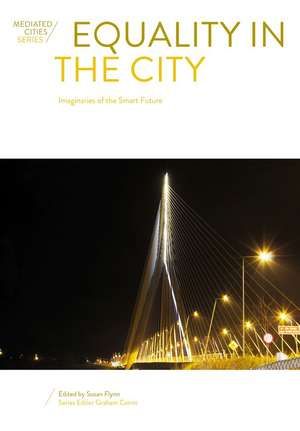Equality in the City: Imaginaries of the Smart Future: Mediated Cities
Editat de Susan Flynnen Limba Engleză Hardback – 17 mar 2022
Equality in the City engenders a timely debate about what future cities might look like and what their concerns should be. Using a multi-disciplinary perspective, it features acclaimed scholars whose work investigates the proposed networked, digital technologies that ostensibly affect planning policies, control infrastructures, and deliver and manage city services and systems. The contributors offer insights into how future cities might be envisaged, planned, and executed in order to be more equal.
Preț: 569.27 lei
Preț vechi: 739.32 lei
-23% Nou
Puncte Express: 854
Preț estimativ în valută:
108.93€ • 114.04$ • 90.13£
108.93€ • 114.04$ • 90.13£
Carte disponibilă
Livrare economică 15-29 martie
Livrare express 04-08 martie pentru 34.74 lei
Preluare comenzi: 021 569.72.76
Specificații
ISBN-13: 9781789384642
ISBN-10: 1789384648
Pagini: 232
Ilustrații: 22 halftones
Dimensiuni: 170 x 244 x 25 mm
Greutate: 0.61 kg
Editura: Intellect Ltd
Colecția Intellect Ltd
Seria Mediated Cities
ISBN-10: 1789384648
Pagini: 232
Ilustrații: 22 halftones
Dimensiuni: 170 x 244 x 25 mm
Greutate: 0.61 kg
Editura: Intellect Ltd
Colecția Intellect Ltd
Seria Mediated Cities
Notă biografică
Susan Flynn is the director of eduCORE, the education research center at the Institute of Technology Carlow in Ireland, and a research associate of the Equality Studies Centre at University College Dublin. She researches equality and digital culture.
Cuprins
Introduction Susan Flynn
Section 1: Urban Crisis
1. Locked down in the neoliberal Smart City: A-systemic technologies in crisis. Eleanor Dare, Reader in Digital Media, Royal College of Art
2. If (equality). Delfina Fantini von Ditmar, Lecturer in Digital Research, Royal College of Art
3. Reading Lefebvre’s right to the city in the age of the internet. Alan Reeve. Reader in Urban Design, Oxford Brookes University
4. Universities, Equality and the Neoliberal City. Richard Hayes. Vice-President, Waterford Institute of Technology
Section 2: City Design
5. Universal Smart City Design. Eoghan Conor O’Shea, Lecturer in Universal Design and Architecture. Institute of Technology, Carlow, Ireland
6. The Design and Public Imaginaries of Smart Street Furniture. Justine Humphry, University of Sydney; Sophia Maalsen, University of Sydney; Justine Gangneux, University of Glasgow; Chris Chesher, University of Sydney; Matt Hanchard, University of Glasgow; Simon Joss, University of Glasgow; Peter Merrington, University of Glasgow; Bridgette Wessels, University of Glasgow
7. Co-creating Place and Creativity Through Media Architecture: The Instabooth. Glenda Caldwell, Associate Professor of Architecture, Queensland University of Technology
8. Narratives, inequalities and civic participation: A case for 'more-than-technological' approaches to smart city development. Niamh Moore-Cherry, Associate Professor of Urban Governance and Development in the School of Geography, University College Dublin; Carla Maria Kanyanen, Post-Doctoral Fellow, University College Dublin and Alma Clavin, Post-Doctoral Fellow, University College Dublin
Section3: Spatial Humanism
9. Building Participatory City 2.0; Folksonomy, Taxonomy, Hyperhumanism. Carl Smith, Director of the Learning Technology Research Centre (LTRC) and Principal Research Fellow Ravensbourne University London; Fred Garnett, London Knowledge Lab and Manuel Laranja, Senior Associate Professor of Innovation and Entrepreneurship, University of Lisbon
10. Psychogeography: reimagining and re-enchanting the smart city. Adrian Sledmere, Lecturer in Cultural Studies, University of the Arts, London
11. Afterword
Rob Kitchin, Professor of Human Geography, National University of Ireland, Maynooth
Section 1: Urban Crisis
1. Locked down in the neoliberal Smart City: A-systemic technologies in crisis. Eleanor Dare, Reader in Digital Media, Royal College of Art
2. If (equality). Delfina Fantini von Ditmar, Lecturer in Digital Research, Royal College of Art
3. Reading Lefebvre’s right to the city in the age of the internet. Alan Reeve. Reader in Urban Design, Oxford Brookes University
4. Universities, Equality and the Neoliberal City. Richard Hayes. Vice-President, Waterford Institute of Technology
Section 2: City Design
5. Universal Smart City Design. Eoghan Conor O’Shea, Lecturer in Universal Design and Architecture. Institute of Technology, Carlow, Ireland
6. The Design and Public Imaginaries of Smart Street Furniture. Justine Humphry, University of Sydney; Sophia Maalsen, University of Sydney; Justine Gangneux, University of Glasgow; Chris Chesher, University of Sydney; Matt Hanchard, University of Glasgow; Simon Joss, University of Glasgow; Peter Merrington, University of Glasgow; Bridgette Wessels, University of Glasgow
7. Co-creating Place and Creativity Through Media Architecture: The Instabooth. Glenda Caldwell, Associate Professor of Architecture, Queensland University of Technology
8. Narratives, inequalities and civic participation: A case for 'more-than-technological' approaches to smart city development. Niamh Moore-Cherry, Associate Professor of Urban Governance and Development in the School of Geography, University College Dublin; Carla Maria Kanyanen, Post-Doctoral Fellow, University College Dublin and Alma Clavin, Post-Doctoral Fellow, University College Dublin
Section3: Spatial Humanism
9. Building Participatory City 2.0; Folksonomy, Taxonomy, Hyperhumanism. Carl Smith, Director of the Learning Technology Research Centre (LTRC) and Principal Research Fellow Ravensbourne University London; Fred Garnett, London Knowledge Lab and Manuel Laranja, Senior Associate Professor of Innovation and Entrepreneurship, University of Lisbon
10. Psychogeography: reimagining and re-enchanting the smart city. Adrian Sledmere, Lecturer in Cultural Studies, University of the Arts, London
11. Afterword
Rob Kitchin, Professor of Human Geography, National University of Ireland, Maynooth
Recenzii
"One of the strengths of this book is that its authors bridge familiar planning and broader urban studies theory with the contemporary challenges of new technology deployment. This bridging helps ground our engagement with the complexity of new technologies in our long-standing obligation to equitably evaluate how new changes in communities will affect all of our residents."




